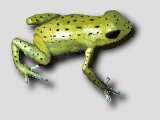Andinobates altobueyensis facts for kids
Quick facts for kids Andinobates altobueyensis |
|
|---|---|
 |
|
| Conservation status | |
| Scientific classification |
|
| Kingdom: | Animalia |
| Phylum: | Chordata |
| Class: | Amphibia |
| Order: | Anura |
| Family: | Dendrobatidae |
| Genus: | Andinobates |
| Species: |
A. altobueyensis
|
| Binomial name | |
| Andinobates altobueyensis (Silverstone, 1975)
|
|
| Script error: The function "autoWithCaption" does not exist. | |
| Synonyms | |
|
Dendrobates altobueyensis Silverstone, 1975 |
|
Script error: No such module "Check for conflicting parameters".
The Andinobates altobueyensis is a small, colorful frog. It belongs to the family of poison dart frogs. This special frog lives only in one place in the world. That place is the Alto del Buey mountain in the Chocó Department of western Colombia. People also call it the Alto de Buey poison frog or the golden poison frog.
Contents
What Does the Golden Poison Frog Look Like?
These frogs are quite small. An adult female is about 1.7 centimeters (0.67 inches) long. An adult male is a bit smaller, around 1.55 centimeters (0.61 inches). That's about the size of a small button!
Colors and Skin
These frogs are completely yellow. Their color can be bright yellow, greenish-yellow, or even golden. Some of them have tiny black spots on their backs. Others might have these spots on their bellies too. Their skin on the back feels a little bumpy.
Special Features
The frog's ear, called the tympanum, is round. Part of it is hidden behind its head. Unlike some frogs, the Andinobates altobueyensis does not have extra skin between its fingers or toes. This means they don't have "webbing" like a duck's foot.
Where Do Golden Poison Frogs Live?
This frog lives in a special kind of wet forest. This forest is found on mountainsides, about 980 to 1,070 meters (3,215 to 3,510 feet) above sea level. It lives on the ground and also in plants called bromeliads. Bromeliads are plants that grow on trees and collect water in their leaves.
Tadpoles and Their Homes
Baby frogs, called tadpoles, might live in the leaves of other plants. These plants are called aroids. Scientists have found many tadpoles in these plants near the top of Alto del Buey mountain. But they are not 100% sure if all of them are Andinobates altobueyensis tadpoles. Some might be from another frog species, Andinobates minutus.
Why Is This Frog Important to Protect?
The golden poison frog lives in a very small area. This means it is at risk of losing its home. People are cutting down trees and clearing land for farms. They are also building new homes. These activities can destroy the forest where the frogs live. Protecting their habitat is very important to help these unique frogs survive.
See also
 In Spanish: Andinobates altobueyensis para niños
In Spanish: Andinobates altobueyensis para niños
 | William Lucy |
 | Charles Hayes |
 | Cleveland Robinson |


